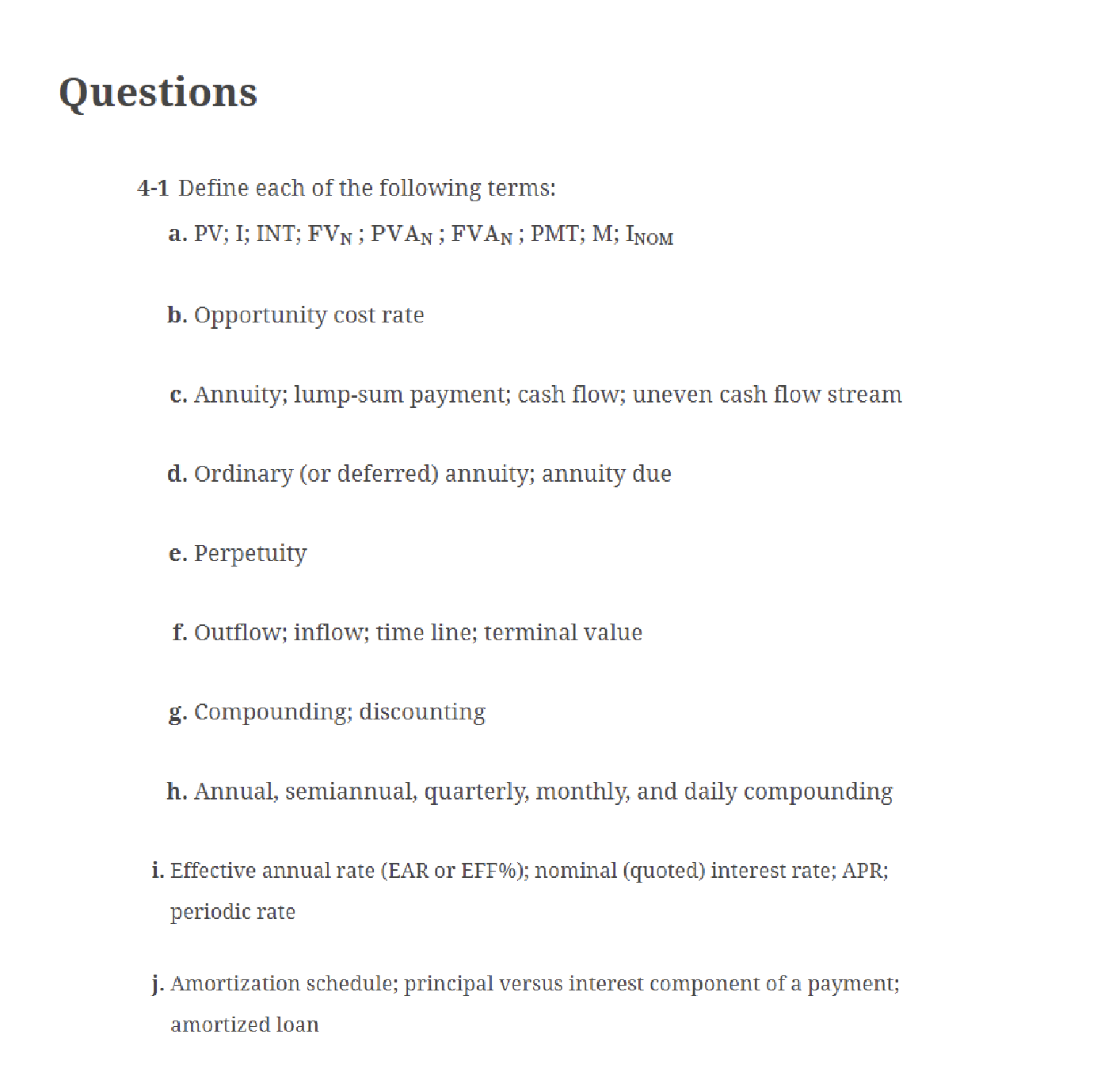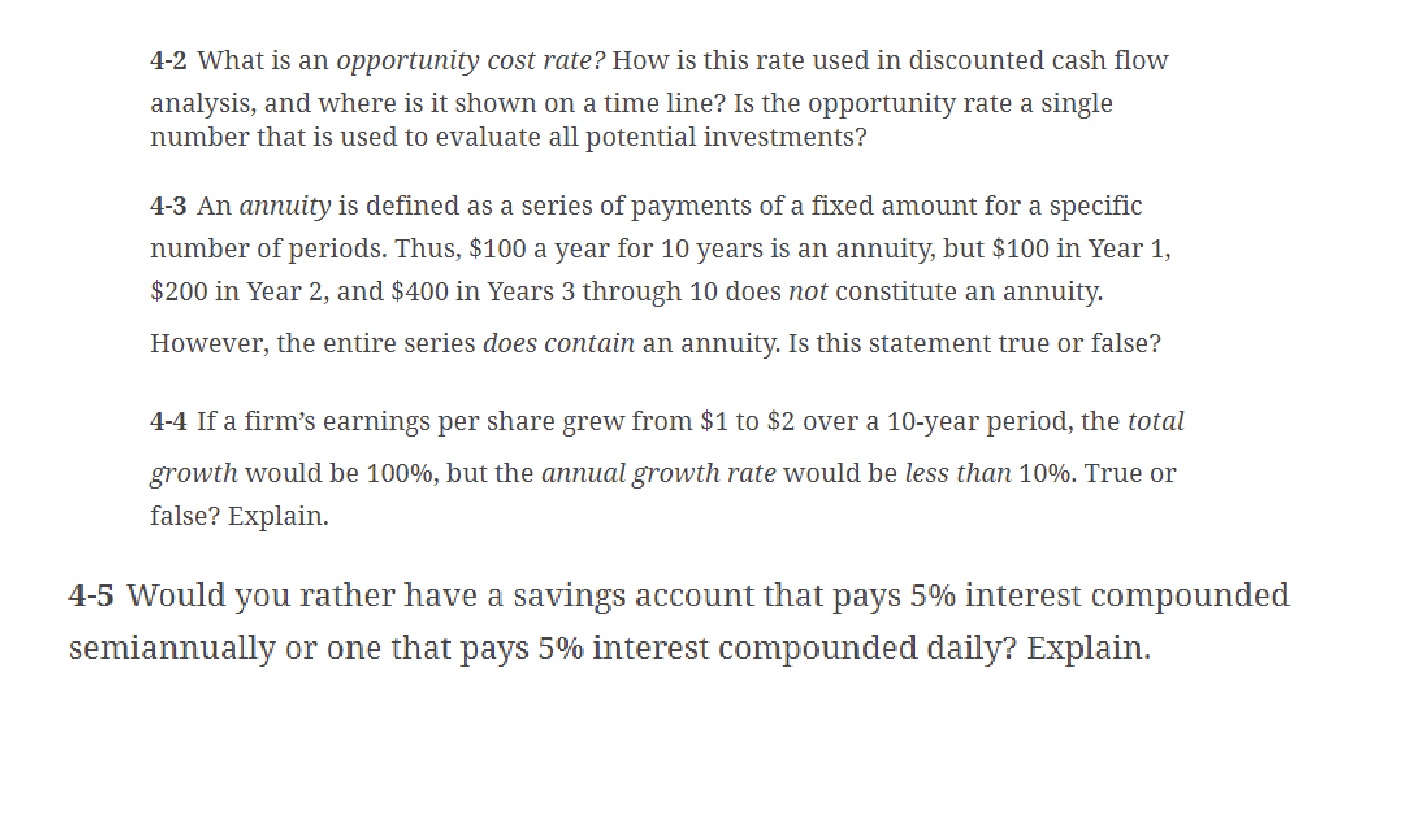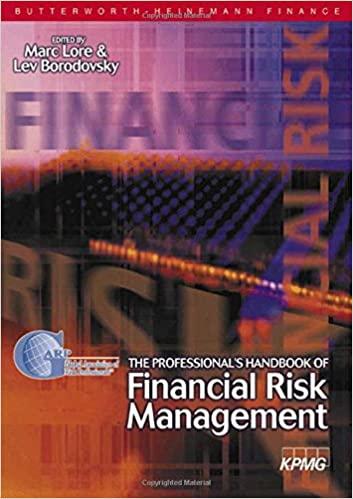Answered step by step
Verified Expert Solution
Question
1 Approved Answer
4-1 Define each of the following terms: a. PV; I; INT; FV N;PVAN;FVAN;PMT;M;INOM b. Opportunity cost rate c. Annuity; lump-sum payment; cash flow; uneven cash

 4-1 Define each of the following terms: a. PV; I; INT; FV N;PVAN;FVAN;PMT;M;INOM b. Opportunity cost rate c. Annuity; lump-sum payment; cash flow; uneven cash flow stream d. Ordinary (or deferred) annuity; annuity due e. Perpetuity f. Outflow; inflow; time line; terminal value g. Compounding; discounting h. Annual, semiannual, quarterly, monthly, and daily compounding i. Effective annual rate (EAR or EFF\%); nominal (quoted) interest rate; APR; periodic rate j. Amortization schedule; principal versus interest component of a payment; amortized loan 4-2 What is an opportunity cost rate? How is this rate used in discounted cash flow analysis, and where is it shown on a time line? Is the opportunity rate a single number that is used to evaluate all potential investments? 4-3 An annuity is defined as a series of payments of a fixed amount for a specific number of periods. Thus, $100 a year for 10 years is an annuity, but $100 in Year 1 , $200 in Year 2, and \$400 in Years 3 through 10 does not constitute an annuity. However, the entire series does contain an annuity. Is this statement true or false? 4-4 If a firm's earnings per share grew from $1 to $2 over a 10-year period, the total growth would be 100%, but the annual growth rate would be less than 10%. True or false? Explain. 4-5 Would you rather have a savings account that pays 5% interest compounded semiannually or one that pays 5\% interest compounded daily? Explain
4-1 Define each of the following terms: a. PV; I; INT; FV N;PVAN;FVAN;PMT;M;INOM b. Opportunity cost rate c. Annuity; lump-sum payment; cash flow; uneven cash flow stream d. Ordinary (or deferred) annuity; annuity due e. Perpetuity f. Outflow; inflow; time line; terminal value g. Compounding; discounting h. Annual, semiannual, quarterly, monthly, and daily compounding i. Effective annual rate (EAR or EFF\%); nominal (quoted) interest rate; APR; periodic rate j. Amortization schedule; principal versus interest component of a payment; amortized loan 4-2 What is an opportunity cost rate? How is this rate used in discounted cash flow analysis, and where is it shown on a time line? Is the opportunity rate a single number that is used to evaluate all potential investments? 4-3 An annuity is defined as a series of payments of a fixed amount for a specific number of periods. Thus, $100 a year for 10 years is an annuity, but $100 in Year 1 , $200 in Year 2, and \$400 in Years 3 through 10 does not constitute an annuity. However, the entire series does contain an annuity. Is this statement true or false? 4-4 If a firm's earnings per share grew from $1 to $2 over a 10-year period, the total growth would be 100%, but the annual growth rate would be less than 10%. True or false? Explain. 4-5 Would you rather have a savings account that pays 5% interest compounded semiannually or one that pays 5\% interest compounded daily? Explain Step by Step Solution
There are 3 Steps involved in it
Step: 1

Get Instant Access to Expert-Tailored Solutions
See step-by-step solutions with expert insights and AI powered tools for academic success
Step: 2

Step: 3

Ace Your Homework with AI
Get the answers you need in no time with our AI-driven, step-by-step assistance
Get Started


